- Clone
- 7-239 (See other available formats)
- Regulatory Status
- RUO
- Other Names
- Sialic acid binding Ig-like lectin 1 (Siglec-1)
- Isotype
- Mouse IgG1, κ
- Ave. Rating
- Submit a Review
- Product Citations
- publications
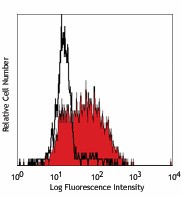
-

IFN-γ + TNF-alpha; stimulated human monocytes (day-3) stained with 7-239 PE
| Cat # | Size | Price | Quantity Check Availability | Save | ||
|---|---|---|---|---|---|---|
| 346002 | 100 µg | 147 CHF | ||||
CD169, also known as Siglec-1 and Sialoadhesin (Sn), is a 210 kD type I single membrane-spanning glycoprotein. It is the largest member of the Siglec family, consisting of 1709 amino acids and belonging to the immunoglobulin superfamily. CD169 is expressed by macrophages and dendritic cells. By its affinity to α2,3-linked sialic acid, it is involved in macrophage binding to different cell types such as granulocytes, monocytes, NK, B and T cells. Several CD169 counter receptors, such as CD227 on human breast cancer cells, CD43 on T cells and CD206 on macrophages, have been reported.
Product DetailsProduct Details
- Verified Reactivity
- Human
- Antibody Type
- Monoclonal
- Host Species
- Mouse
- Immunogen
- Human Rhinovirus (HRV14) infected, monocyte derived-DCs
- Formulation
- Phosphate-buffered solution, pH 7.2, containing 0.09% sodium azide.
- Preparation
- The antibody was purified by affinity chromatography.
- Concentration
- 0.5 mg/ml
- Storage & Handling
- The antibody solution should be stored undiluted between 2°C and 8°C.
- Application
-
FC - Quality tested
- Recommended Usage
-
Each lot of this antibody is quality control tested by immunofluorescent staining with flow cytometric analysis. For flow cytometric staining, the suggested use of this reagent is ≤0.5 µg per 106 cells in 100 µl volume. It is recommended that the reagent be titrated for optimal performance for each application.
- Application Notes
-
Additional reported applications (for the relevant formats) include: Western blotting and inhibition of erythrocyte-rosetting with cells expressing CD169.
-
Application References
(PubMed link indicates BioLegend citation) -
- Kirchberger S, et al. 2005. J. Immunol. 175:1145.
- Schrauf C, et al. 2009. J. Immunol. 183:4440.
- Product Citations
-
- RRID
-
AB_2189031 (BioLegend Cat. No. 346002)
Antigen Details
- Structure
- Type I single membrane-spanning lectin, 1709 amino acids, 210 kD, belongs to the immunoglobulin superfamily
- Distribution
-
Macrophages, dendritic cells
- Function
- Adhesion molecule
- Interaction
- α-2,3-linked sialic acid
- Ligand/Receptor
- CD227, CD43 and CD206
- Bioactivity
- Mediates sialic-acid dependent binding to granulocytes, monocytes, NK, B and T cells.
- Cell Type
- B cells, Dendritic cells, Macrophages
- Biology Area
- Cell Adhesion, Cell Biology, Immunology, Innate Immunity
- Molecular Family
- Adhesion Molecules, CD Molecules, Siglec Molecules
- Antigen References
-
1. Xiong YS, et al. 2009. Clin. Biochem. 42:1057.
2. Varki A, et al. 2009. Glycoconj J. 26:231.
3. Rempel H, et al. 2008. PLoS One. 3:e1967.
4. Crocker PR, et al. 2001. Trends Immunol. 22:337.
5. Hartnell A, et al. 2001. Blood 97:288. - Gene ID
- 6614 View all products for this Gene ID
- UniProt
- View information about CD169 on UniProt.org
Related Pages & Pathways
Pages
Related FAQs
Other Formats
View All CD169 Reagents Request Custom ConjugationCustomers Also Purchased
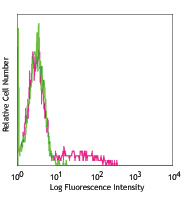
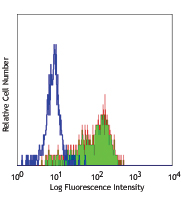
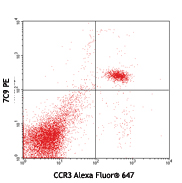
Compare Data Across All Formats
This data display is provided for general comparisons between formats.
Your actual data may vary due to variations in samples, target cells, instruments and their settings, staining conditions, and other factors.
If you need assistance with selecting the best format contact our expert technical support team.
-
Purified anti-human CD169 (Sialoadhesin, Siglec-1)
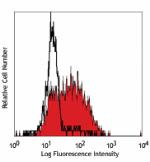
IFN-γ + TNF-alpha; stimulated human monocytes (day-3) staine... -
PE anti-human CD169 (Sialoadhesin, Siglec-1)

IFN-γ + TNF-α stimulated human monocytes (day-3)... -
Alexa Fluor® 647 anti-human CD169 (Sialoadhesin, Siglec-1)
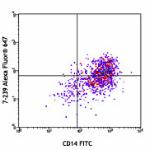
Human peripheral blood monocytes were stimulated with TNF-&a... 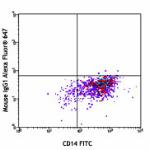
-
APC anti-human CD169 (Sialoadhesin, Siglec-1)
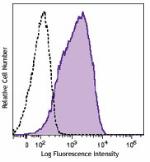
IFN-γ + TNF-α-stimulated human monocytes (day-3)... -
Brilliant Violet 605™ anti-human CD169 (Sialoadhesin, Siglec-1)
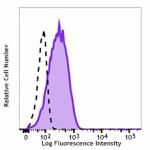
IFN-γ and TNF-α-stimulated human monocytes (day-3) were stai... -
TotalSeq™-A0206 anti-human CD169 (Sialoadhesin, Siglec-1)
-
Brilliant Violet 421™ anti-human CD169 (Sialoadhesin, Siglec-1)
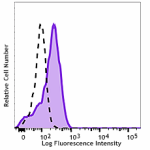
IFN-γ and TNF-α-stimulated human monocytes (day-3) were stai... -
PE/Cyanine7 anti-human CD169 (Sialoadhesin, Siglec-1)
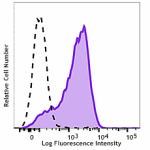
IFN-γ and TNF-α-stimulated human monocytes (day-... -
PE/Dazzle™ 594 anti-human CD169 (Sialoadhesin, Siglec-1)
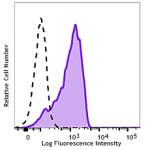
IFN-γ and TNF-α-stimulated human monocytes (day-... -
TotalSeq™-C0206 anti-human CD169 (Sialoadhesin, Siglec-1)
-
PerCP/Cyanine5.5 anti-human CD169 (Sialoadhesin, Siglec-1)
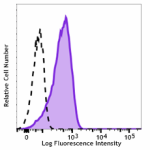
Human PBMC monocytes were stimulated with IFN-γ and TNF-α fo... -
TotalSeq™-B0206 anti-human CD169 (Sialoadhesin, Siglec-1)
-
TotalSeq™-D0206 anti-human CD169 (Sialoadhesin, Siglec-1)
-
Spark Red™ 718 anti-human CD169 (Siglec-1) (Flexi-Fluor™)
-
Spark Blue™ 574 anti-human CD169 (Siglec-1) (Flexi-Fluor™)
-
Spark Blue™ 550 anti-human CD169 (Siglec-1) (Flexi-Fluor™)
 Login / Register
Login / Register 





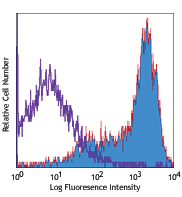



Follow Us